The Resident Evil games ranked from worst to best
We stumble and groan our way through the best and worst of the wildest survival horror series in games.
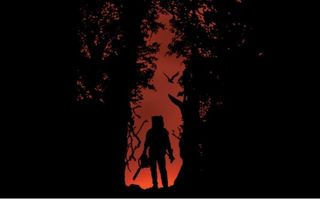
Which Resident Evil game is best? We’re eating away at our own brains to give our verdicts on some of PC gaming’s most beloved series, including Dark Souls and Mass Effect.
As the series that popularized the survival horror genre, Resident Evil has attempted to sustain its hold on the elusive zombie shooting crown since its inception in 1996. Suffice it to say, Resident Evil hasn’t maintained a keen, constant rule over the genre, blasting further off into bizarre, convoluted lore dumps and Matrix-worthy action sequences as the series grew in scope and ambition. Through reinvention after reinvention, Resident Evil games may not always be great, but they’ve always been fascinating, curious objects. And it’s because of that wild experimentation that Resident Evil still has a firm grip on us, redefining the genre and forcing the entirety of game design to respond—hell, Dead Space was going to be System Shock 3 before Resident Evil 4 came out.
While they may have arrived shuffling and moaning and hungry for anti-aliasing, most of the main series Resident Evil games has been available on the PC at one time or another—sorry, Code Veronica. So, for players new and old, we’ve reflected on the series highs and lows, and ended up with a true, inarguable ranking for the series that cannot die.
As of this latest update after the release of the Resident Evil 2 remake, we've decided to keep both the original and this new version in the list. They're very different games, after all, despite sharing a setting, characters and story.
Now, in ascending order...
Resident Evil: Operation Raccoon City
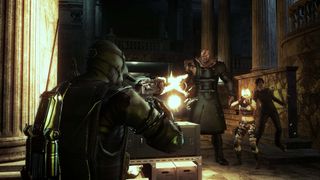
Developed: Capcom, Slant Six Games Published: Capcom
2012
James: We don’t talk about Operation Raccoon City. In our review, Jon Blyth puts it lightly, saying, “The good stuff is all swaddled in that weak gunplay, an annoying automatic snap-to cover system, and moments like the Birkin-G battle—a fight so poorly communicated and unfair that you'll wish computer mice still had balls, so that you could rip out your mouse ball and chew it while slobbering all over yourself.” The “good stuff” is just the setting and familiar characters, the implication of Raccoon City’s ideas and ambitions wrapped up in a cozy Resident Evil blanket. But clearly, due to godawful controls, a smattering of port hiccups, and poor design, we hope Operation Raccoon City never rises from the dead.
Samuel: This was one bad fanfiction idea turned into a disastrously boring shooter. Played alone, the friendly AI is terrible, the links to Resident Evil 2 are tenuous and your squad of faceless nobodies belongs in the bin. Junk. The remake of Resi 2 pretty much allows me to forget this forever.
Umbrella Corps
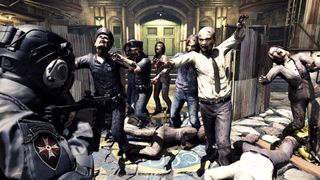
Developed: Capcom Published: Capcom
2016
James: This game doesn’t have to be this low on the list. This could have been avoided. During several preview events PC Gamer’s Tom Marks expressed genuine interest in Umbrella Corps as an interesting competitive shooter that didn’t lazily assume the competitive deathmatch template and throw it in a thin Resident Evil diegesis. Zombies roam each map, and they don’t attack you outright, but by disabling other players’ magic zombie repellant devices, you can send the horde after them—a novel idea, I think. But for god’s sake, the PC version launched with mouse controls that were straight up broken. On the PC, that’s a huge chunk of your userbase, and for most players, unforgivable.
The biggest gaming news, reviews and hardware deals
Keep up to date with the most important stories and the best deals, as picked by the PC Gamer team.
Resident Evil 6
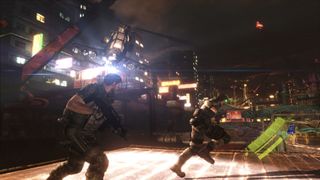
Developed: Capcom Published: Capcom
2012
James: Fuck this game. The media [looks into mirror] cycle for Resi 6 had me believing it would be the most complete game in the series yet, ticking the horror, action, and lore boxes alike for everyone. And it did. The campaigns themselves are varied and pretty from afar, and playing as characters from all over the nonsense Resi timeline is some kind of cool, but the controls gut everything good about RE’s over-the-shoulder design ethos that worked so well in 4 and 5. The guns feel like pea shooters in comparison to previous entries and character movement is suspended somewhere between a full blown Gears of War third-person shooter and the original static stop-and-shoot design of Resi 4.
It’s so terrible a half-measure that the slightest potential for feeling unease is rendered inert. The tension boils and burns into a blackened, sour paste once you learn how to roundhouse and suplex and dive into a supine militaristic shooter stance on command. Sure, you could kick and suplex in Resi 4, but never with such reckless abandon. Where’s the horror and disempowerment in being a damn spec ops ninja demigod?
Samuel: I accept it's a bloated game, and the Chris campaign is particularly bad, but its combat—once you learn the full spread of abilities available to you, which the game does a terrible job of teaching—offers a lot of scope for player expression and fun acrobatics. Problem is, no-one really wanted a Resident Evil game to be about those things, so I understand the criticism Resi 6 got. I have a certain fondness for its Mercenaries mode, though, and wrote about it some time ago. A reboot needed to happen after this.
Resident Evil: Revelations
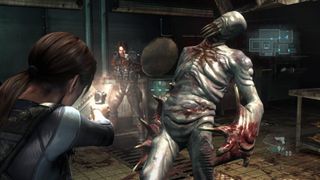
Developed: Capcom, Tose Published: Capcom
2012 (PC, 2013)
James: Revelations was most potent on the Nintendo 3DS, but blown up on the PC years after the fact, the absence of novelty leaves its shortcomings out in the open. The environments feel small, empty, and static. Enemies are simple-minded and appear in smaller groups than Resi 4 or 5, which turns combat into an intimate affair, sure, but without the crushing threat of numbers, encounters rely more on surprise than stress.
It doesn’t help that Revelations’ opening moments take place on a beach where your first threat arrives in the form of beached fish blobs. Survival horror. Revelations isn’t a terrible Resident Evil game by any means, but a very rote and restrained one, especially on the PC.
Samuel: It felt like an attempt to merge the design fundamentals of old Resident Evil with Resi 4 controls, and yeah, its handheld origins are apparent. For completionists, it's nice that this made its way to PC, but it's surely nobody's favourite entry in the series.
Resident Evil 5

Developed: Capcom Published: Capcom
2009
Samuel: I would place this one higher, but the default game doesn't come with splitscreen co-op—and that's the lifeblood of Resi 5 on consoles. You can mod it in, though.
James: I understand your pain, Sam, but thanks to the magic of the internet, I finished Resident Evil 5 in one prolonged, disgusting, burger-fueled sitting with a Florida-based friend. It’s definitely not designed to be played so quickly, but off the tail of Resident Evil 4, one of my favorite games of all time, how could I not? And I’m glad I did, because swallowing such a chunky, bitter videogame pill means I felt everything Resi 5 had to offer, all at once.
Resi 5 feels like a string of Resi 4’s most intense set pieces—the village scene, or cabin attack—one after the other, and with a co-op friend no less, but devoid of the horror or intrigue that made its predecessor so memorable and strange. Coupled with a shallow, troublesome depiction of Africa and a story that eventually went full anime (which may work for some people), Resi 5 fell flat for me and I haven’t returned to it since. It has some of the best combat in the series, but so too a very leaky heart.
Tim: My strongest recollection of this one is not hating the fact a lot of it takes place in startling sunshine (which seemed like quite a bold idea for a largely risk-averse series), quite liking the Sheva Alomar character, and the sharp intake of breath people in the office took as we arrived at the section I can now only think of as ‘Problematic Village’ for the first time. Without wishing to reopen that debate, I do wonder what Wired’s tame anthropologist would have made of that part if they’d played through to it. Still, on action alone, I still think it’s one of the better entries.
Samuel: Yeah, a lot of those criticisms are spot-on. I was also a fan of Sheva, even if Resi's characters are more shouting props than characters in the traditional sense. Chris and Sheva's interactions are quite pleasant—an underrated bit of camaraderie in a game. There are fewer good design ideas in Resi 5 than Resi 4, but it's a far better representation of its predecessor's influence than Resi 6 is. Wesker is so much fun in this one, too. Didn't they make him British to make him more evil? I love that so much.
Wes: Seven minutes. Seven minutes is all I can spare to play with you.
Resident Evil Zero
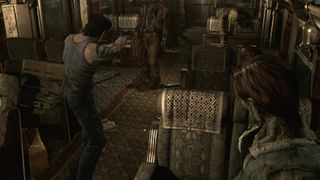
Developed: Capcom Published: Capcom
2002 (PC, 2016)
James: Resi Zero was actually my first Resident Evil game. It greatest strength is nailing the trademark tension and helplessness of the series, tank controls included. Switching between Rebecca and Billy divides the zombie survivalist tension further, and I dig the opening train scene for its suffocating, slow introduction to the new characters and intense, timed finale.
But when I try to remember nearly anything else about the game, I go blank. There’s another mansion, some levers, and more zombies as expected, but this time they’re riddled with massive leech monsters. In 2017, the zeitgeist has long since moved on from leeches as an immutably horrifying concept. They’re slimy and dark and small—get over it. It’s a good Resident Evil game, but far from the most distinct or memorable.
Tim: I instantly disliked Billy. Between his session musician haircut and awful tribal tattoo, he wasn’t the kind of hero you warmed to. The convicted war criminal background (he’s a marine framed for failing to carry out a massacre) wasn’t exactly relatable either, but then that’s hardly been Resi’s forte. I also recall Resi 0 as being the my final point of departure with anything like a grip on the Umbrella meta plot. Like, why is Dr Marcus keeping all those leeches up his skirt?
Still, the character-switching between Billy and Rebecca added something to the puzzling, and the initial setting was pleasantly claustrophobic, in a vaguely Horror Express kind of way. Unfortunately, the fact the game later decamped to a more conventional haunted house, which I’ve now almost completely forgotten, only underlines Zero’s unremarkable status as sawdust in the Resident Evil sausage.
Resident Evil 3: Nemesis

Developed: Capcom Published: Capcom
1999 (PC, 2000)
Tim: My incipient dementia means I’m struggling to remember some of these, but I do recall at the time thinking this might be my favourite Resi, simply because it gave Jill Valentine an assault rifle to begin with. (I should caveat that by saying only if you choose easy mode, which apparently younger me did.) In any case, being able to go weapons free on the coffin dodgers from the outset was sweet relief if, like me, you had taken to micromanaging ammunition reserves to a pathological level. Invariably, I’d ended the previous two Resi games with an inventory stocked full of every type of round in the game, only to discover that besting the final boss didn’t require half of it.
Resi 3 also gave us its eponymous antagonist, the unkillable Nemesis which would rock up at inopportune moments as you explored, terrifying players with its poor dental work and gauche taste in gentlemen’s outerwear. Upon arrival, the Nemesis would usually hiss “STAAAAAARS”, presumably identifying the prey which it had been programmed to relentlessly track, but perhaps also complaining about the quality of actor he’d be expected to share screen time with in the 2004 movie Resident Evil: Apocalypse. For bonus cringe factor, revisit any of the dialogue spoken by Umbrella’s hired merc Carlos Olivera. The character’s Mexican accent is delivered by voice actor Vince Carazzo, who as far as I can tell is very Canadian. Usual shonkiness aside, being in Raccoon City before and after the events of Resi 2 was cool, and I maintain this should be higher on the list but for the fact no-one else on the team seems to recall it.
Joe: After playing the original Silent Hill in early 1999, I went into Resident Evil 3 with a degree of misplaced confidence. Against the Resi series' B-movie-like framing, Harry Mason's debut outing offered a different kind of horror in that this was the first proper psychological horror game I'd ever played. Dealing with twisted and unscrupulous characters that seemed so much worse than Wesker and Birkin, switching between alternate dimensions, and laying waste to some of its gut-wrenching bosses really affected me, and ultimately caught me off-guard. I therefore entered Nemesis thinking I knew what to expect.
And for the most part, this was the case. It had slow moving and predictable zombies, overpowered weaponry, and ridiculously incongruous mix-and-match puzzles in a similar vein to its forerunners. Nemesis was clearly the biggest threat and even then felt like a slightly beefed up version of Mr X/T-00 from Resident Evil 2. Like its predecessors, Resi 3 also had the familiar area-loading door opening animations which I'd come to understand kept me safe from whatever horrors I'd left behind in previous zones. In trouble? Run to the next door and leave your woes at your back.
This, of course, was not the case in Resident Evil 3. For the first time, enemies—namely Nemesis—could follow you into new areas in a bid to continue the hunt. In the case of Nemesis, it would burst through gates and doors with such force I swear the animations gave me nightmares hours after playing. Sure, Jill was equipped with an assault rifle from the off—but this only meant she was expected to use it. One simple change to the Resi formula suddenly made the third series entry one of the scariest horror games I'd ever played at the time, and left me with one of my fondest, scariest videogame memories to this day.
Resident Evil: Revelations 2
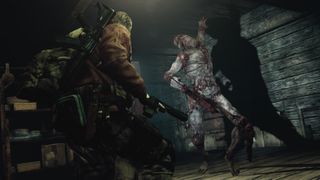
Developed: Capcom, Tose Published: Capcom
2015
James: Revelations 2 is the most underrated game in the series, easily. It embraces Resi 4’s overwhelming combat scenarios and expressive arsenal, then chucks it in a B-movie Resi best-of on a wacky, weird prison island. Even better, the co-op play requires genuine cooperation, pairing off a traditional, fully equipped classic RE character, Claire Redfield and Barry Burton, with a much more helpless partner—a teen and a child. By using a flashlight and brick-chucking they couldn’t headshot monsters, but could stun and distract them to thin out the pack. Hell, Moira could be an unrigged crash dummy as long as she got to keep her precious, precious dialogue. “I mean, what in the moist barrels of fuck,” is classic Resi if I’ve ever heard it.
Revelations 2 also did the episodic structure justice. Episodes released a week apart, a somewhat artificial way to break up the game since it’s safe to assume the whole thing was content complete, but having a new two-hour cooperative Resident Evil romp every week for a month was a delight. It didn’t just occupy my mind for a weekend—I was arrested for a month, by hokey mix-and-match supernatural monsters and dopey (but lovable) characters no less.
It wasn’t the series’ peak in level design, puzzle design, or storytelling, but it’s definitely the most self-aware and digestible, a comparably light-hearted survival horror tour through Resident Evil’s most endearing traits—up until that point, at least.
Resident Evil 2
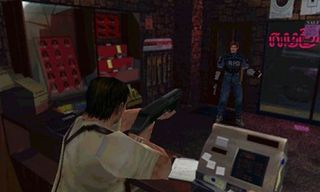
Developed: Capcom Published: Capcom
1998 (PC, 1999)
Tim: A really important entry in the series. Expanding out from the original’s mansion setting to take in the actual zombie apocalypse happening in Raccoon City was smart, if obvious. Less obvious was the decision to craft two intertwining stories for players to hop between. The excellent pairing of rookie cop Leon S. Kennedy (tough day on the job) and Claire Redfield, the sister of missing S.T.A.R.S agent Chris fromm the first game, feels very much like classic Resi. In the same way that Romero’s “of the Dead” sequels expanded from the low-key original, so Resi 2 was a more widescreen, big budget take on the survival horror concept. As soon as you saw police stations littered with the remains of dead officers, it was clear the ante had been upped substantially. The notion of trying to escape from a city collapsing around you gave players the perfect sense of dramatic impetus, while at the same time providing the designers plenty of room to fill in the story with that sweet Umbrella lore. Director Hideki Kamiya would go on to make Devil May Cry, Okami, Bayonetta and later form PlatinumGames. Plus block a bunch of people on Twitter.
Samuel: I was 12 when I convinced my dad to buy this for me on CD-ROM, and yeah, it felt like a more complete version of that original idea with better protagonists.
Resident Evil 2 (Remake)
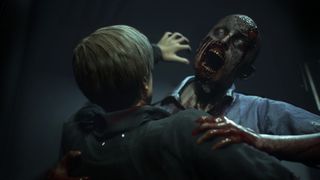
Developed: Capcom Published: Capcom
2019
Samuel: 21 years later, this remake evokes nostalgia for Resi 2's locations and characters, but feels like a totally new game. You can run through the RPD without loading screens! What a treat. The zombies are properly nasty, too. This feels like a compilation of the best bits of the modern third-person Resident Evil entries, with scary moments to the standard of Resident Evil 7. It does make you wonder which of the older entries will get the remake treatment next.
Ultimately, since we scored it one point fewer than Resident Evil 7, it technically belongs just below it on this list.
Andy K: What makes this really special is how it combines the slow, challenging survival horror of the classic games with the intense over-the-shoulder combat of RE4. There could have been a disconnect there, but Capcom really nailed it. RE4 still has it beat in terms of bosses, variety, and weapons, but as a pure distillation of what makes the old style of Resident Evil great, you couldn't ask for much more.
I also like how it isn't a slave to the source material, giving old locations and encounters a fresh spin. As Samuel says, it feels like a brand new game: contemporary and thrilling, yet hitting the same beats as the 1998 original. I scored it a point lower than RE7 because the Tyrant chases feel under-developed, and it's not as subversive or surprising, but it's pretty much one of the best games in the series, and I'd love more remakes in the same style.
Resident Evil 7
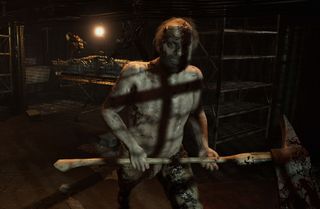
James: Jack Baker is my new daddy. He’s the freakiest, goofiest horror game antagonist out there and I love him even though he’d like to put a shovel through my head. Can't blame him. It’s all in the name of family, which is Resident Evil 7’s beating heart. I absolutely love the Bakers, a bundle of southern cliches and horror archetypes filtered through Resi’s videogame campiness.
Resident Evil has always been a self-aware take on the zombie horror subgenre, but Resi 7 extends that reach to the horror as a whole, touching on The Texas Chainsaw Massacre, Saw, and The Ring for inspiration. As a big horror soup, it works, mostly because the Bakers are most realized monsters from the entire series, and the vast majority of horror games in general. When Jack bursts out of a wall and calls you by name, or when Marguerite coughs up another swarm of zombie bees, it’s funny, but it’s also really damn scary, especially given the fidelity of each character model. You can see their expression from far off, and guess what? That smile isn’t a good sign.
For the first two-thirds of the game, the family terrorizes you in their own special way, leading you through a different section of the Baker property, gating progress with surprisingly classic tools like keys and bizarre shadow puzzles. It’s all so incredibly old school, yet set against the highly detailed backdrop of the Baker property, it feels new again—a perfect soft reset for the series.
The enemies could be more diverse, extra modes felt cordoned off and held back for DLC, and when the Baker family disappears two-thirds in, so does every ounce of the game’s charm. But despite its lopsidedness, Resi 7 is a bright signal light for the series. For the first time in a decade, I can’t wait to see where it goes next.
Tim: Here’s the thing that’s really stunning about Resident Evil 7. How many series of this size have survived such a total reinvention, whilst winning over the critics, and without sacrificing what made players fall in love with the idea in the first place? It’s got to be almost none. And yet Resident Evil has now pulled that trick off twice, first with 4 and now with 7. Interestingly, at a GDC talk given by director Koshi Nakanishi, he split the first six games into two trilogies. The clear suggestion being that 7 could be the start of another. I certainly hope so.
Nakanishi also said he wanted to reinvent horror gaming, and make Resi as synonymous with excellence as The Dark Knight is for superhero movies. Judge for yourself whether they hit that goal, but they certainly took the inherent promise of first-person horror games like Amnesia and Outlast and ran with it. Resi 7 is a game that’s so tense to play—especially the first time—that after tough sessions I found myself stressed and snappy. Creating a supporting cast that’s so instantly, disgustingly iconic as the Bakers is also no mean feat. I can’t wait to see where Capcom goes next with it.
Resident Evil / Resident Evil HD Remaster
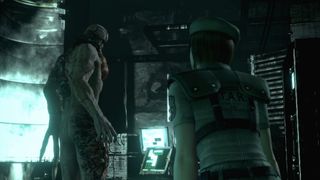
Developed: Capcom Published: Capcom
Original: 1996 | Remaster: 2002 (PC, 2015)
James: It may be unfair for an arbitrary list article like, say, this one, to combine the original Resident Evil with its remake as one entry, but the legacy of the original was only strengthened by such a stellar update and subsequent PC release. I have fond memories of the original game, and its restrained combat, resource management, and puzzle design are still sensible and fun today—the tank controls are even endearing after some practice.
The REmake, as it’s commonly referred to, updated the original’s cheeky horror with a complete facelift and the omnipotent threat of Crimson Heads, nearly unkillable zombies that ‘wake up’ after being incapacitated, and can chase the player throughout the entire world. In the original, zombies couldn’t even follow you from one room to the next. None of these additions compromised the vision or design of the original, instead building out what I imagine Resident Evil’s original team had in mind. It’s one of the truest remasters out there, and one of the best survival horror games ever made.
Samuel: I'm delighted Capcom brought the GameCube remake of the first game to PC. Its pre-rendered backgrounds have aged incredibly well, and the choice of colour palette is lurid but gorgeous. Since this specific type of survival horror game essentially died out after Silent Hill 4 and then the Forbidden Siren games, it's not like it's been surpassed in the meantime by better games.
Wes: I was amazed by REmake when I first played it on the GameCube so many years ago—how could a game look so good!?—and amazed again, years later, at how much atmosphere it still has. The mansion is so moody, the art and lighting sell it as a real place. A twisted, sometimes goofy, sometimes horrifying place. Those pre-rendered backgrounds aren't just for show: they're so artfully done, they help frame how you play Resident Evil, conveying the sense that you're an intruder in this place, always creeping and on edge, being watched from weird angles. It's maybe the only use of tank controls in gaming that I like, thanks to that marriage of theme and function.
There were always little things to unnerve me, whether it was footsteps echoing through an empty room or a giant fucking zombie shark leaping out of the water to bite me in half. I swear I almost jumped out of my skin.
Resident Evil 4
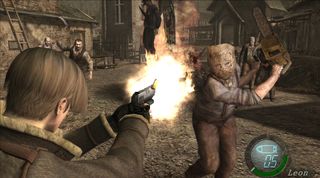
Developed: Capcom Published: Capcom
2005 (PC, 2007)
Samuel: This might be the most masterfully paced action game ever created. There are so many clever ideas in Resi 4 that make fleeting appearances, before being cycled out for others. A giant statue coming to life and chasing you through a hall, for example, or a lake monster which kills you before the boss fight if you shoot the water, or frightening enemies that work according to sound, or the Regenerators which you can only kill by sniping their organs using a heat sensor. It's wild and remarkable—there is no other modern game like it. It reinvented third-person shooters, perhaps by accident, with its placing of the camera over Leon's shoulder. I even like the ludicrous story and dialogue. Resident Evil 4 is not really scary for extended periods of time, but it is constantly atmospheric.
James: It took me six months to finish Resident Evil 4. (To be fair, I was a skittish teen.) Like Sam explained, it’s full of surprises, both in terms of what it’s squirrelling away and in its surprising, intense combat design. But it’s the surprising intimacy of the combat that really shook me. The villagers aren’t particularly scary on their own—they’re just rural folks, but it’s their humanity, their implied cunning and relatability, that makes them so terrifying. And when they roll in by the dozens from every angle while you frantically try to climb a ladder or board up a house, it’s impossible not to feel the implication of that cunning. They overwhelm in numbers, but being able to see the whites of their eyes and hear their chatter turn them from brainless bullet sponges into something real—sometimes too real. It’s a miracle that despite Resi 4’s trademark campiness and the fact that scythed parasites explode from the enemies’ heads that it still retains such a taut, tangible sense of unease.
Tim: I got to play the game for a few minutes when it was first unveiled at a Capcom event in Vegas, and even in that brief time it was clear that this was a complete reinvention. More importantly, it immediately felt right. A bold evolution that retained the spirit of the original but was bursting with fresh design ideas. The biggest testament to Resi 4’s brilliance is how much time I spent replaying it, which I never bothered with the others, just because that combat—knee-capping gibbering villages as they shambled towards you with farm implements!—felt so perfect, even after the credits had rolled multiple times. Perhaps Resi 7 will be a similarly dramatic reinvention, but Resi 4 will remain one of the all-time classics, and a high watermark it’s hard to see the series ever hitting again.
Wes: I'll leave you with this.
If it’s set in space, Andy will probably write about it. He loves sci-fi, adventure games, taking screenshots, Twin Peaks, weird sims, Alien: Isolation, and anything with a good story.
Most Popular


